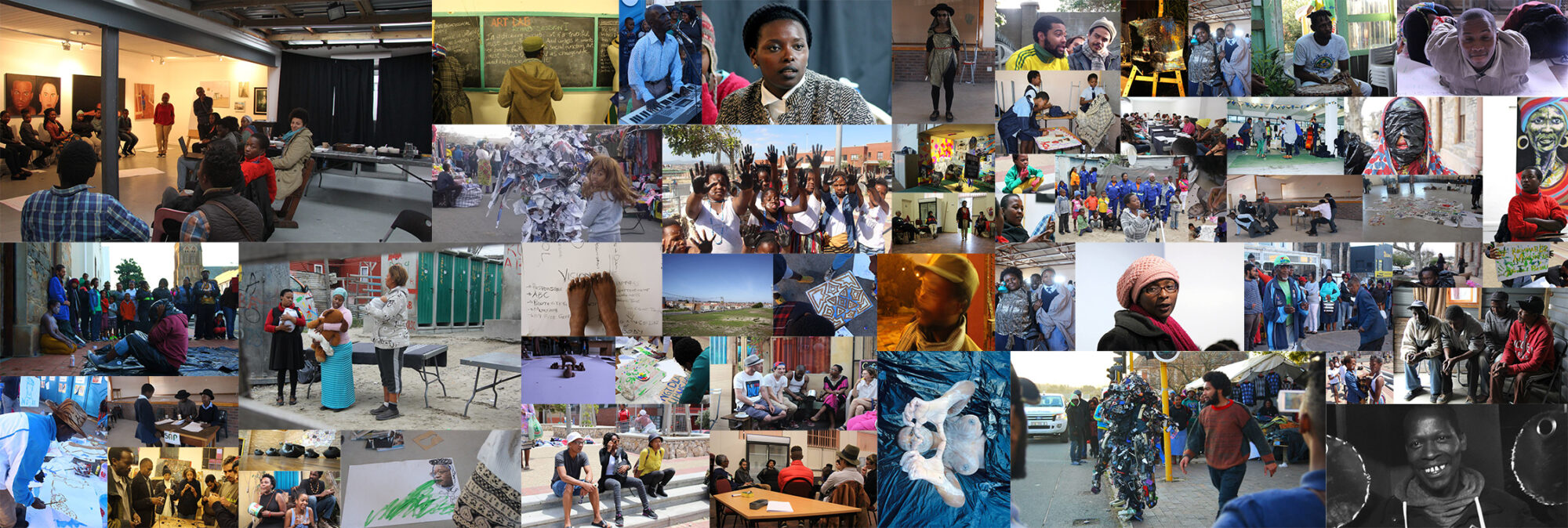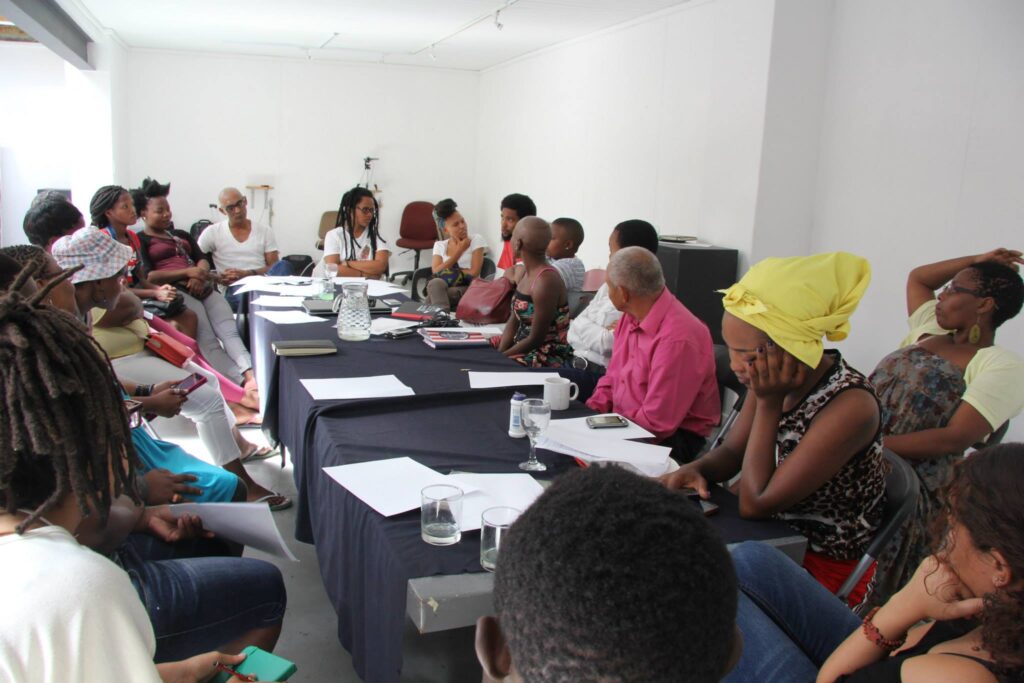by One Stab
The state in which we find ourselves currently on the continent and in the world calls for, amongst other things, a shift toward new imaginations and new practices of education that emerge from, and respond to the dissonance of oppressed peoples’ lived realities. Voices all around the world are undermining the education project of imperialism that alienates the majority of people from themselves and their realities. Many of these voices are coming from within the university/the academy and, in profound and deeply creative ways, they are calling the legitimacy of the academy into question. The academy and academics, as they currently exist, are fast becoming obsolete. If the university, and the entire education system for that matter, is to survive as an institution that is relevant to society, it needs to centre the project of liberation as its most urgent political project. In this piece I intend to think through the limitations of the academy, its relationship to knowledge(s), education and knowledge outside the academy, as well as the exciting potentialities that the current moment holds.
Ultimately I try to imagine what education could be beyond the death of the academy.
Diagnosis
In the academy and in elite society in general the value of knowledge depends largely on where it is located. Knowledge that is produced by (and for) the academy tends to be the most highly valued. This superiorness is further upheld by the downholding of other knowledges. An example of this: a paper written by a university sociologist on ‘perspectives of unemployed youth on work’ will, in the academy, be valued more than the actual perspectives of unemployed youth on work.
People’s opinions, stories, experiences, ideas etc. are only considered legitimate in the academy if they have been transposed by an academic. They cannot stand on their own or represent themselves because of the barriers, structural, social and epistemological, that the academy is built on. These barriers are increasingly brutally policed in order to maintain a sterile social and physical climate around the academy. This climate is completely at odds with the realities of the everyday.
This constructed distance, between marginalised knowledges and institutional knowledge, and between the constructed quiescence of the campus juxtaposed with the chaos of the everyday, maintains a sharp epistemological dissonance between the academy/academics and society/most people’s lives. That dissonance, along with the historical, racial, gendered, political-economic and geographical mechanisms that reinforce it, is usually enough to exclude the majority of people from the academy. If not exclude them, it’s usually enough to silence them by making them feel like they do not belong.
But there is a new campus politics emerging
There are new pedagogies of dissonance
New ways of embodying
And creatively giving life to dissonance…
At this particular historical moment, in the current crisis in higher education in South Africa (which I speak from in this section), the academy is being undermined and de-legitimised in significant ways. Black students and workers are bringing their whole selves and their lived realities of exploitation and dispossession, to the university.
Cecil Rhodes is now adorned with shit
Shacks are constructed on campus
In full view of Fuller and Smuts
Tyres were burnt
Along with paintings and other symbols of alienation
Transformation, combustion and transcendence
This transplanting of social reality into the sanctified university is a new pedagogy of dissonance. Immersing dissonance represents a creative critique of the university’s constant refusal to engage with the lived realities of oppressed peoples in any way other than as data for publishing papers.
It is no longer enough to theorise dissonance. Now that the vultures of symbolic and structural violence are coming home to roost, dissonance is beginning to theorise the university. And the university is coming up short
By centering Black dissonance in white spaces, ideological struggle is being waged on campuses in creative ways. Black students, newly admitted into the sterile halls of the ivory tower, are challenging the underlying values of the colonial education system. Decolonisation, and the characteristic chaos that necessarily accompanies that political project, is disrupting the present order and is posing new threats to the system of elitist education that teaches assimilation, conformity, ignorance, brutality, and submission (all of which are imperialist dreams). This is significant because of the challenge to the conservative values of colonial education, but also due to the context in which the university finds itself under contemporary capitalism.
Sickness progressing
Largely due to structural transformations under neoliberalism and the advancing corporatisation of universities through closer links with industry, the few spaces within the academy that hold radical potential, spaces for challenging imperialism in all its forms, are under threat.
Frenzied drives to publish
To get promoted
The serious undervaluing of teaching
Trends toward casualisation of junior academic labour
Neoliberalism, the contemporary imperial illness, is wreaking havoc on academics, their wellbeing and the type of academic work they do and how it is valued by the university. These factors, many of which have characterised the academy for a long time, but have been exacerbated by contemporary trends, emphasise individual achievement within very narrow parameters.
This undermines any potential for imagination of the university as anything outside of a project in itself. The increasing individualisation of academic practice, and the undermining of the social bases from which a collective project could be imagined and pursued, has meant that the idea of the university has been crystallised and is pursued as the project itself.
Knowledge for papers, for publishing, for my promotion, for my discipline, for the academy. Pledge allegiance to university as project; dislocated from the society it seeks merely to interpret (rather than transform it).
University as project is no longer tenable
It is no longer tenable for universities to fund research projects on poverty and inequality while paying starvation wages to outsourced cleaners and, at the same time, millions to vice-chancellors.
This university will not be allowed to continue
We cannot allow the academy to reproduce dissonance through its payscale while at the same time profiting from it by theorising and publishing it. To the academics who write papers on radical politics but are sweating in their offices when students and other workers are chowing stun grenades outside, time is up.
You are obsolete
Life support
If the university is going to survive as an institution that is relevant to society, it’s mode of engagement with broader society is going to have to be radically reimagined and new, relevant practices will need to be shaped. We will have to look at how liberation educators have, in the past, emerged from the limitations of the academy.
I reckon we also need to think about this dissonance thing
If we take seriously as a pedagogy the centering of dissonance, what types of intellectuals might emerge? What types of possibilities would open up for collective struggle and radical imagination if the university understood itself as a core part of, and a central contributor to societal change?
Notes toward practice in investigation and reflection
Beyond death
I am talking about shifts toward more popular forms of education in which people are engaged, and treated as full participants, knowledgeable of themselves and their reality; movements away from institutional insularity; a single staff body without distinction between manual and intellectual labour; a social force fighting for all people’s safety and against sexual violence; a teaching practice educating beyond coloniality, its borders and toward new pan-African connections.
Phoenix style post-script / comparative post-mortem
Actually the academy died a long time ago
For those with radical imaginations of difference
Of different ways of being
And living together
For those with devotion to realise those imagined societies, these limitations of the university were diagnosed and were/are well known. It was largely outside of the prescribed parameters of normative academic practice that intellectual practice has been oriented toward revolutionary visions.
There are multiple examples of people and movements that have shaped intellectual and educational practices around the understanding that the world is a classroom – that knowledge and education already exist in organic abundance outside the academy. But also within it.
Despite its fatal limitations
I believe that the academy can still be mobilised as an incredible resource for struggle
That should be the project
Part of that project will necessarily be the challenge from within, insistence on the centring of dissonance. Another, parallel part of that project will be imaginations and practices of education that redraw the boundaries and sites of the university – the spaces that we understand as productive of knowledge.
For the African Party for the Independence of Guinea and Cape Verde (otherwise known as PAIGC), university consisted in the concrete conditions of people’s lives: Their practice of education was one and the same as the struggle for liberation, this emerged from the realities of their situation. The building of schools, construction of hospitals, improving agricultural practices, and the readying of the people for armed struggle; all of these were understood by the party cadres, and the people with whom they lived, learned and created, as their living education, their living politics, their mode of awareness-raising toward shaping a positive, self-determined future.
In another context, closer to home for me, SACHED (South African Committee for Higher Education), a creative, community response to the restricted scope for Black learning in colonial tertiary institutions, designed a curriculum that was intended to fill the gap of university for Black people. But actually, in certain branches and at certain points in time, the programmes went far beyond the limitations of the university.
Because of its positioning within society, on the fringes of legality, largely outside the status quo, SACHED’s approach to education emerged from the dissonance of marginality and resonated with the lived realities of Black people in ways that the university never could.
Jump to the now
KYC (Know your continent) is in many ways a continuation of some of the work that SACHED was doing in the 1980s around African history education. We use some of the resources developed by Prof NoSizwe et al. and draw on the Western Cape’s rich history of popular and political education, particularly those parts associated with the Unity Movement and other community education programmes. We do education with participants from local high schools, university people, community members and activists and try to root the conversations within contemporary politics and struggles.
Our starting point in KYC is to ask what the history of the continent can teach us about the roots of our current situation and how to respond to it. We ask how a historical consciousness, a thinking about how people have intervened in, and shaped their worlds in the past, might equip us for responding to contemporary struggles.
Similarly, in People’s Education, we depart from the position of centering contemporary African experiences and realities. From here we try to grapple with particular challenges that come from that departure point; challenges relating to spirituality, this thing of culture in all its various interpretations, sexuality, gender and the related systemic oppressions, knowledges, musics, and various expressions of imperialism.
Hair salons
Bars
And studios are some of our universities
Ultimately
What we are trying to do is
Imagine
Beyond the death of the academy
The Pan-African university
…
Who no know
Come know











